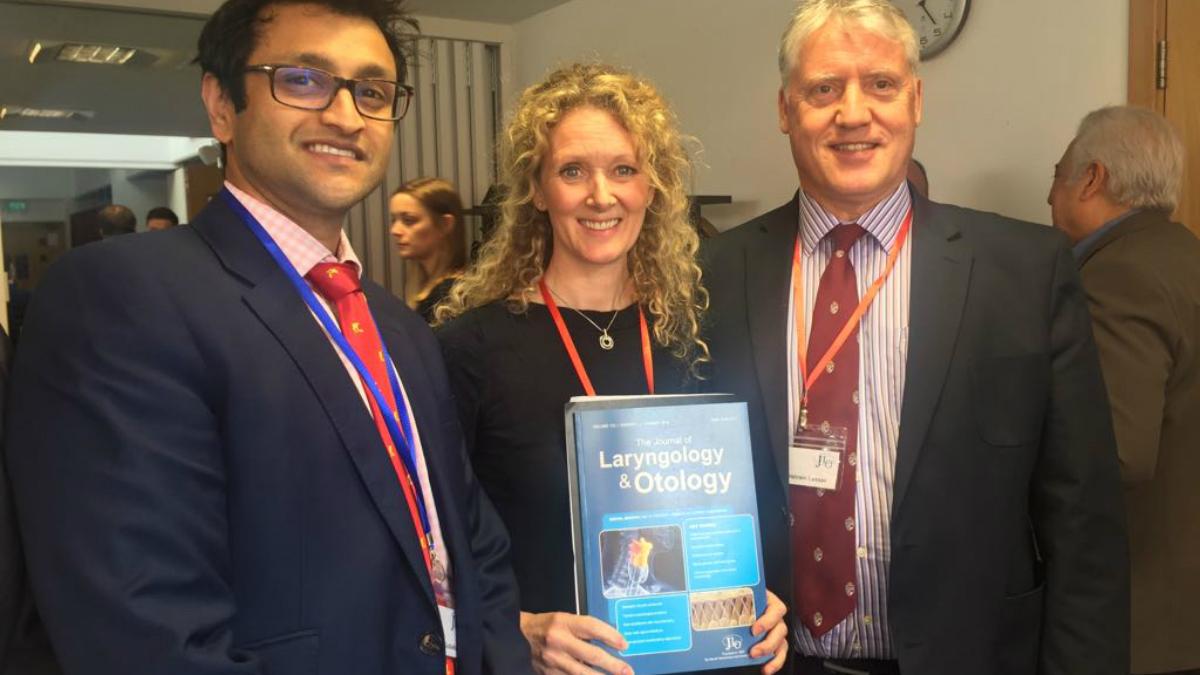A physiotherapist has received an award for her role in producing the best article for the Journal of Laryngology and Otology.

Physiotherapist Lisa Burrows with co-authors Anand Kasbekar and Tristram Lesser
Lisa Burrows, an independent physiotherapist prescriber at Southport and Ormskirk NHS Trust, received the honour as part of a team who were recognised for outlining their work on improving care for patients with dizziness and balance disorders.
The award recognised the impact of devising and running an independent prescriber-led balance clinic that has cut waiting times for appropriate treatment, reduced the number of unnecessary hospital visits and consultant referrals, and proved a big hit with patients. The team were also best poster presentation at the national non-medical prescriber conference last year.
Ms Burrows told Frontline the project has also been very positive in terms of her own personal professional development, as she has gained independent prescriber qualifications.
In 2011, following mergers between hospital and community teams, staff were asked to make efficiency savings and look at redesigning care pathways to ensure patients were seen in a timely way by the right staff.
Huge implications
‘Many patients with giddiness and dizziness were not being seen early so their conditions worsened and as a result they were experiencing other problems, such as falls, hip fractures and prolonged hospital stays. So the implications for patients and the cost implications of avoiding this are huge,’ Ms Burrows said.
Now the Southport and Ormskirk physiotherapy-led vestibular clinic sees and treats all patients with dizziness and balance disorders referred by GPs to the ear nose and throat (ENT) department.
Referral letters are triaged by an audiologist, who also performs an otological examination and hearing test. This is followed by an assessment with the independent prescriber physiotherapist. An ENT consultant is in a clinic nearby if a joint consultation is needed.
Reducing hospital visits
Diagnoses, treatments and patient satisfaction were studied, with an analysis of the impact of medication management (stopping or starting medicines) on patients and service.
The award winning paper reveals that having an independent prescriber physiotherapist leading the balance clinic has reduced the number of hospital visits and onward referrals. Nearly half of all patients required medication management as part of their dizziness or balance treatment.
In the first 12 months of the new clinic, 413 new patients with dizziness and balance disorders had appointments. The most common diagnoses were benign paroxysmal positional vertigo and vestibular migraine. Eighty four per cent of patients required self-management strategies, 50 per cent exercise therapy, 48 per cent medication management and 24 per cent a particle repositioning manoeuvre.
Significantly, 100 per cent of patients were happy to recommend the service to friends and family.
First point of contact
Ms Burrows said she was very happy with the award and wanted to pay tribute to her ENT consultant Tristram Lesser. ‘He was the first person to support me. Mr Lesser says “let’s do it, let’s iron out problems”. He was a mentor and a friend.’
She said that the work shows that ‘a normal district general hospital, not a tertiary centre, can still provide excellent services that meet the demands of the patient group’.
‘Having an independent prescriber physiotherapist as the first point of contact delivers improved outcomes and speeds discharge. It has made a massive difference and this is a model pathway that can be replicated anywhere that physios are working.’
Number of subscribers: 0